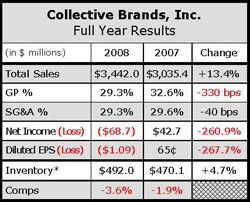 Saucony and Sperry Top-Sider both delivered double-digit gains for Collective Brands Inc. in the fourth quarter, but it wasn't enough to offset sluggish traffic at its Payless chain and higher costs coming out of China.
Saucony and Sperry Top-Sider both delivered double-digit gains for Collective Brands Inc. in the fourth quarter, but it wasn't enough to offset sluggish traffic at its Payless chain and higher costs coming out of China.
The company lost $144 million, or $2.28 per diluted share, in the fourth quarter after a $130.2 million in non-cash charges for Stride Rite trade names and goodwill. The adjusted net loss, excluding charges, was $34.9 million, or 55 cents a share, and compares with a net loss of $46.6 million, or 73 cents per diluted share, in the year-ago period. Adjusted EBITDA plunged 65.4% to $8.4 million in the fourth quarter from $24.2 million in Q4 2007.
Sales were down 5.4% to $735.2 million for the period, due primarily to a 6.6% comp decline that was driven by a high-single-digit decline in traffic at Payless that hurt unit sales. Sales at Payless were said to be “favorably driven” by a 5% increase in average unit retail prices and higher sales in Latin America.
On a conference call with analysts, Matt Rubel, Collective Brand's chairman, CEO and president, said footwear consumers “became more price conscious in the midst of a highly-promotional retail quarter.” But he also indicated that heavy discounting at mid- and upper-mid tier retailers brought down the overall price in “primary branded product closer to Payless in certain categories” than usual.
Payless international comparisons were also impacted by changes in foreign currency exchange rates, primarily in Canada and to a lesser extent in Europe. On the bright side, Payless average unit retail prices rose 5% and the company was able to maintain its retail market share. Payless Latin American sales increased double-digit percentage. The sales gain was tempered by new customs and inspection regulations imposed in Ecuador, which hampered the companys ability to get product into the country. Payless has opened its first 12 stores in Columbia.
At Saucony, strong sales were driven by the running specialty channel. Key technical styles, such as the Omni, ProGrid Ride and Hurricane, drove growth in run specialty, while athletic styles drove sporting goods growth in family channels.
Sperry Top-Sider saw strong sell-through rates and higher sales to existing accounts. Beyond its core boat shoe offerings, Sperry is also attracting more female customers with new product collections and increased styling.
Keds had a “difficult quarter and year,” with sales declining in the low-teens in 2008. New leadership is positioning the brand as “America's first sneaker, a brand of youthful optimism, and focusing on re-establishing the Champion as its product icon.” Keds is launching an environmentally-friendly collection, Green, for spring and fall, as well as bringing back Pro-Keds into its men's portfolio.
The Stride Rite Childrens group was challenged by a “pullback in consumer spending affecting the premium consumer segment.” The group's results are led by the licensed programs of Jessica Simpson and Nickelodeon.
Collective Licensing International strengthened its brand portfolio during the fourth quarter, inking new licensing deals for Airwalk in Australia and New Zealand, and Vision Street Wear in South Korea. CLI also agreed to a three-way partnership with Intersport North America and Finish Line for the use of the Vision Street Wear brand. The program will be re-launched for back-to-school in “a very big way.”
Gross margins for the company eroded to 16.7% from 27.5% due to by higher merchandise costs coming out of China and the negative sales leverage on Payless occupancy costs, higher depreciation and amortization, and a more promotional selling environment. Net SG&A was lower due to lower compensation expense and integration savings but grew as a percentage of sales.
Impairment write-downs included $88 million for trade names related to the Keds and Stride Rite and $42 million of goodwill at the Stride Rite retail segment. It also included $19 million of other, of which $13 million covered the impairment of $13 million for 31 Payless and Stride Rite stores.
Inventory was $492.0 million at the end of 2008, up 4.7% compared to last year as a result of higher product costs. Aged inventory as a percentage of total inventory was lower than the prior year reflecting a cleaner inventory position. The year-end average in-store inventory at Payless stores was higher on a dollar value basis versus the prior year due to higher merchandise costs. Payless footwear units were actually lower. Stride Rite inventory was down 3% at year end, in part due to the expiration of the license agreement for Tommy Hilfiger adult footwear business at the end of December.













